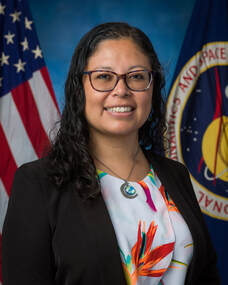BIOGRAPHY

Jackelynne Silva-Martinez, PhD was born in Cusco, Peru. She attended elementary school, middle school and part of high school in different regions within Peru, including Cusco, Arequipa, and Lima. She then moved to the United States and graduated from high school. Jackelynne earned two bachelor degrees from Rutgers University; one in Mechanical and Aerospace Engineering, and a second one in Spanish Translation and Interpretation. She obtained a Master's Degree in Aeronautical Science with concentration in Human Factors Aviation & Aerospace Systems from Embry-Riddle Aeronautical University, and a second Master’s Degree in Aerospace Engineering with concentration in Space Human Systems Integration from Georgia Institute of Technology. Jackelynne obtained her PhD Degree in Leadership with concentration in Organizational Management from Carolina University. She also received an honorary degree as Doctor of Science from the Universidad Nacional de Piura in Peru. Jackelynne is an alumna of the International Space University Space Studies Program, and is certified in Engineering Management, Principal Engineer, Test Engineer, Test Operations, Lean Six Sigma, Agile Coach, Scrum Master, Product Manager & Product Owner.
Jackelynne works at NASA Johnson Space Center as Artemis Mission Integrator for the Moon to Mars Program Exploration Operations Office. She previously worked for the Human Health and Performance Directorate serving as Human Systems Engineering and Integration Lead for the Commercial LEO Development Program and as Human System Manager for the Gateway Program. Jackelynne previously worked within the Flight Operations Directorate for the International Space Station and Artemis Programs as Flight Controller and Systems Engineer executing mission planning and integration. She worked as a Mechanical Engineer and Test Operator at NASA Jet Propulsion Laboratory on the Robotic Manipulators and Deployable Booms group performing verification and validation ground tests for the Mars Science Laboratory known as the Curiosity Rover. Prior to that, Jackelynne worked for Lockheed Martin Space Systems Company as Antennas Mechanical Design Engineer and then Systems Integration and Test Engineer for commercial and government satellite programs. Jackelynne is an American Institute of Aeronautics and Astronautics Associate Fellow and leads NASA's Agile Community of Practice.
Jackelynne participated in several space analog missions including Human Exploration Research Analog at Johnson Space Center, and Mars Desert Research Analog in Utah. Jackelynne is the founder of the Centro de Ciencia, Liderazgo y Cultura, which brings topics of science, leadership, and culture to the young generation at an international level. She and her husband have a son and a daughter. She enjoys reading, traveling, dancing, and learning from different cultures. Her interests include human spaceflight, mission operations, mission integration, space architecture, systems engineering, human systems integration, project management, innovation, STEM and STEAM initiatives. Jackelynne has been serving as lecturer on these topics at various universities, conferences, and professional organizations.
Jackelynne works at NASA Johnson Space Center as Artemis Mission Integrator for the Moon to Mars Program Exploration Operations Office. She previously worked for the Human Health and Performance Directorate serving as Human Systems Engineering and Integration Lead for the Commercial LEO Development Program and as Human System Manager for the Gateway Program. Jackelynne previously worked within the Flight Operations Directorate for the International Space Station and Artemis Programs as Flight Controller and Systems Engineer executing mission planning and integration. She worked as a Mechanical Engineer and Test Operator at NASA Jet Propulsion Laboratory on the Robotic Manipulators and Deployable Booms group performing verification and validation ground tests for the Mars Science Laboratory known as the Curiosity Rover. Prior to that, Jackelynne worked for Lockheed Martin Space Systems Company as Antennas Mechanical Design Engineer and then Systems Integration and Test Engineer for commercial and government satellite programs. Jackelynne is an American Institute of Aeronautics and Astronautics Associate Fellow and leads NASA's Agile Community of Practice.
Jackelynne participated in several space analog missions including Human Exploration Research Analog at Johnson Space Center, and Mars Desert Research Analog in Utah. Jackelynne is the founder of the Centro de Ciencia, Liderazgo y Cultura, which brings topics of science, leadership, and culture to the young generation at an international level. She and her husband have a son and a daughter. She enjoys reading, traveling, dancing, and learning from different cultures. Her interests include human spaceflight, mission operations, mission integration, space architecture, systems engineering, human systems integration, project management, innovation, STEM and STEAM initiatives. Jackelynne has been serving as lecturer on these topics at various universities, conferences, and professional organizations.

